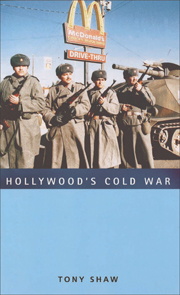Book contents
- Frontmatter
- Contents
- Acknowledgements
- List of Abbreviations
- Introduction
- 1 Love and defection
- 2 The enemy within
- 3 Projecting a prophet for profit
- 4 Of gods and moguls
- 5 Negotiable dissent
- 6 Turning a negative into a positive
- 7 A cowboy in combats
- 8 Secrets and lies
- 9 The empire strikes back
- Conclusion
- Bibliography
- Film Index
- General Index
5 - Negotiable dissent
Published online by Cambridge University Press: 05 August 2013
- Frontmatter
- Contents
- Acknowledgements
- List of Abbreviations
- Introduction
- 1 Love and defection
- 2 The enemy within
- 3 Projecting a prophet for profit
- 4 Of gods and moguls
- 5 Negotiable dissent
- 6 Turning a negative into a positive
- 7 A cowboy in combats
- 8 Secrets and lies
- 9 The empire strikes back
- Conclusion
- Bibliography
- Film Index
- General Index
Summary
One of the great tragedies of culture and learning took place in Alexandria, an ancient seaport of Egypt, about 630 A.D. In the Alexandrian library had been gathered together, starting about 1500 B.C, most of the literary works, scientific knowledge and philosophies of the intellectuals of the known world up to that time. It is not quite clear whether this unequalled collection of books was destroyed by fire all at once or piecemeal during the riots when Caesar visited Cleopatra, when the Arabs overran Alexandria, or at a later date. But this tragedy gave significance to a phrase which was to harass us forever after, the phrase ‘the burning of the books’.
Doubtless with this in mind, the framers of our American Constitution wrote into the First Article two guarantees which have given character and provided insurance for the perpetuation of American democracy. One was the guarantee respecting the establishment of religion and the free exercise thereof. The other was the prohibition of any law which would abridge the freedom of speech or of the press. They are not unrelated; they are inter-related. They were intended to complement each other …
It is to this theme, in dramatic form, that ‘STORM CENTER’ addresses itself. Arthur H. DeBra, Motion Picture Association of America, July 1956Generating and maintaining media support had been a relatively easy task for the American government during the Second World War. Newspapers, broadcasters and filmmakers were not beyond criticising Washington's tactics, but only a few questioned its motives and overall strategy. The nation had, after all, been attacked, and was fighting a war in which men and women were dying on various battlefronts. On top of this, notwithstanding its unprecedented scale, the conflict lasted only four years. The Cold War was different. Neither side had officially declared war, comparatively few Americans came face to face with the enemy, and the conflict lasted some four decades. In such circumstances, any government – democratic or dictatorial – was bound to meet some form of criticism, opposition or even resistance. This made official management of the media all the more vital.
- Type
- Chapter
- Information
- Hollywood's Cold War , pp. 135 - 166Publisher: Edinburgh University PressPrint publication year: 2007



